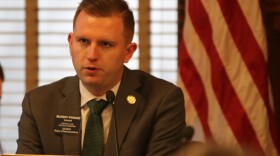Rural hospitals face “catastrophic cash shortages” brought on by the COVID-19 crisis and need congressional action to save them, according to a Leawood, Kansas, advocacy group that represents hundreds of rural hospitals.
In a letter Monday addressed to the leaders of the U.S. House and Senate, the National Rural Health Association asks that 20% of the $100 billion in funding for hospitals in the CARES Act, the $2 trillion coronavirus response bill passed by Congress last month, be set aside for rural providers.
It also asks Congress to accelerate Medicare payments, ensure that rural hospitals can access the Paycheck Protection Program (PPP) and pass legislation to provide additional funding for rural health care providers. The PPP, also part of the CARES Act, is a $350 billion program aimed at enabling small businesses to keep current workers or rehire those who were laid off.
“The loss of revenue over the last few weeks due to the inability to provide non-emergency care is destabilizing core health services in rural America,” the letter states.
Rural hospitals were hurting before the pandemic, with about half of them posting financial losses. In the last 10 years, 128 rural hospitals have shuttered, including six in Kansas and seven in Missouri, according to the University of North Carolina’s Rural Health Research Program.
Just last month, Sumner Community Hospital in Wellington, Kansas, abruptly closed. The owner of the hospital, Kansas City-based RHG Consolidated, blamed a revenue shortfall and lack of patient demand. The closest hospital is about 25 miles away, in Winfield, Kansas.
The National Rural Hospital Association boasts 21,000 members, including hospitals, clinics, doctors, nurses and other health care providers.
Brock Slabach, the group’s senior vice president of member services, said many of the association’s members were “hanging on by a thread” because of a surge in patients that “they’re having a very difficult time keeping up with and managing.”
“But then more importantly, more hospitals all over the country in rural areas are seeing a depletion of their patients due to the cancelation of elective and non-emergent services, creating 40, 50, and in some cases, 60% less revenue that they're experiencing now because of that,” Slabach said.
Although the lower population density of rural areas makes it less likely that COVID-19 will spread there than in densely populated urban areas, rural populations tend to be older and have more underlying health conditions, increasing their risk of dying from the disease.
A recent report by the Lerner Center for Public Health Promotion at Syracuse University said that many rural hospitals, already stretched thin, “may not survive from the financial hit of the coronavirus.”
“Cancellations of regular doctor’s visits by fearful patients and postponement of ‘non-urgent’ elective medical procedures to prepare for a surge in coronavirus cases means that these hospitals are missing out on a substantial portion of their regular revenue,” the report said, echoing Slabach. “At the same time, hospitals are finding themselves in a position to expend precious funds on high-cost personal protective equipment, such as masks and other essential resources.
“Many rural hospitals will not be able to withstand these financial losses for very long before shutting down for good,” the report concluded.
Even before the advent of the novel coronavirus, the cause of COVID-19, The Chartis Center for Rural Health estimated that 450 rural hospitals nationwide were “performing at levels similar to rural hospitals at the time of their closure.”
“We came into this (coronavirus) emergency about 10 steps behind already,” Slabach said. “And then you see the volumes plummet from where they were before the emergency. And if you’ve only got 33 days cash on hand, which is the median for an average rural hospital, you don’t have a lot of margin for error.”
Dan Margolies is a senior reporter and editor at KCUR. You can reach him on Twitter @DanMargolies.
Copyright 2020 KCUR 89.3







